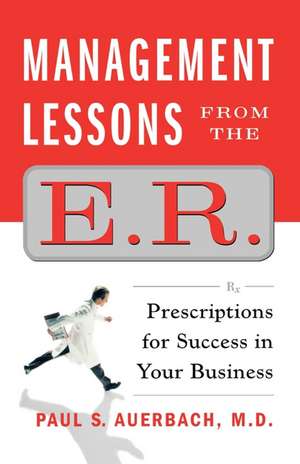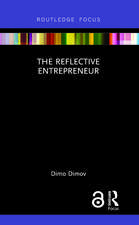Management Lessons from the E.R.: Prescriptions for Success in Your Business
Autor Dr. Paul Auerbachen Limba Engleză Paperback – 31 mai 2010
Applying such medical truisms as "The patient who isn't screaming may be the one in the most trouble" and "Don't count on luck," Dr. Auerbach provides prescriptions for solving all types of managerial emergencies. Using real-life experiences from his many years as an E.R. physician, COO of public and private medical management companies, and venture capitalist, he teaches executives how to prepare for and remain calm in difficult situations. In this unique book, he shows how responsibility, great expectations, and the impact of failure force doctors to be at the top of their game at all times. From assessing the first symptoms of a patient's or company's problem to determining the quickest and most effective means for treatment, Auerbach details the true-to-life pressures, fears, and challenges one faces both in acute care medicine and in the most vital actions of one's career, and does so with humor, style, and grace. The effect of this wisdom: the ability to deal with any business dilemma, whether it be a short-term setback or the beginning of a more serious condition. The prescriptions here are lessons for success in business and, at the same time, for success in life.
Preț: 104.20 lei
Nou
Puncte Express: 156
Preț estimativ în valută:
19.94€ • 20.82$ • 16.50£
19.94€ • 20.82$ • 16.50£
Carte disponibilă
Livrare economică 14-28 martie
Preluare comenzi: 021 569.72.76
Specificații
ISBN-13: 9781451606089
ISBN-10: 1451606087
Pagini: 272
Dimensiuni: 140 x 216 x 18 mm
Greutate: 0.29 kg
Editura: Free Press
Colecția Free Press
ISBN-10: 1451606087
Pagini: 272
Dimensiuni: 140 x 216 x 18 mm
Greutate: 0.29 kg
Editura: Free Press
Colecția Free Press
Notă biografică
Paul S. Auerbach, M.D., is a practicing physician, serving as Clinical Professor of Surgery in the Division of Emergency Medicine at Stanford University, as well as a partner at Delphi Ventures. A founder of the Wilderness Medical Society, he has written classic wilderness medicine books. He lives with his wife and three children in Los Altos, California.
Extras
Introduction
"Dr. Auerbach, we need you in Room One. Now."
The patient wasn't breathing. His heart had stopped beating and his skin was blue. As I grabbed the defibrillator paddles, I noticed a young observer beginning to swoon. I figured it was the first time he was this close to watching someone die. "Are you OK?" I asked while I shocked the patient and watched his torso rise from the gurney in response to the jolt.
"I think I know him," the young man whispered.
"Well, take a look." He came closer and the remaining color drained from his face. "It's my dad's partner." I was doing a venture capitalist friend a favor and allowing his son to follow me around the E.R. because he was interested in a health-care career.
"Better step outside," I told my friend's son as I administered a second shock. It was touch and go for fifteen minutes, but I restored my patient's heartbeat and whipped him upstairs for an emergency angioplasty. He was saved.
Two hours later, I walked into the Dean's office to discover a colleague who had been raked over the coals for missing his revenue number. My friend shook with anger as he mumbled profanities under his breath. He was about to lose control and worsen the situation. I had been to business school and was a seasoned veteran of the academic trenches.
"Better step outside," I told him as I began to formulate a plan for how to manage his dilemma. I crafted a strategy and calmed him down. He walked away with a deal instead of a demotion. He was saved. At the time, I was struck by how adrenaline was my hormone du jour. Being a doctor in an E.R. could be helpful in a business situation. The seed was planted.
Soon thereafter, a professor at the Stanford Business School, Gene Webb, invited me to lecture on crisis management.
"Hell, Paul," he told me, "you probably handle more crises in a week than most corporate execs see in a lifetime. What do you think?"
It was an interesting challenge. How do you convert encounters as diverse as delivering a baby in the parking lot, diagnosing an earache, and managing a heart attack into useful lessons for business managers? Can you diagnose a cancer in your company like you can a melanoma on a surfer's nose? The easy analogies popped up -- Be Prepared (I showed the class a slide of a disaster communications center); Know Your Resources (slide of a search dog); Don't Panic! (slide of a man who fell off a ladder and embedded a chisel in his forehead); Place Your Best Person in Charge (slide of me in a white coat). When I spoke, the business students easily made the stretch from medicine to management. What really held their attention was the inherent common sense of it all. Everybody can relate to diseases and cures. Certain truisms are universal when framed in the appropriate context.
Soon thereafter, I left academia and became a public company COO, where this concept was constantly reinforced. I became completely convinced that the lessons I had learned in the E.R. were superbly valid preparation for my role as a business leader. I sought the best qualities needed by effective managers, and kept citing examples of behaviors I had come to admire in my life as a physician executive. Brilliant businessmen are insightful, collaborative, decisive, and honest. These also happen to be the qualities of the great doctors.
Today I divide my time between venture capital, advising senior managers in start-up companies, and treating patients in the E.R. What impresses me with each of these activities is that there can be as much excitement (and danger) in managing a company as there is in resuscitating a motorcycle accident victim. Every day, I see fascinating new parallels between the juggling act of a hectic E.R. and all the balls that someone throws into the air to run a business. I've become thoroughly persuaded that a healing approach is the right answer for much of what we encounter on the job and in our personal lives. I'm amazed by how I can apply the reflexes and skills of an "E.R. doc" to problems in the corporate environment. I believe these observations can help you, too! Because I'm a doctor, people see me as a problem solver. This book evolved to help business leaders become problem solvers.
The management gurus preach that you are inside a tornado or bridging a chasm, that you are too trusting or too paranoid, or that you need to downsize, upsize, reorganize, proselytize, sanitize, or "something-ize." There are rules for chief executives, rules for Board members, and even rules for revolutionaries. This is often momentum stuff. I contend that in the midst of chaos, there are guiding principles, fundamentals that doctors "in the pit" figure out as soon as they face their first cardiac arrest. The best doctors and managers come to realize that there truly are constants in a relentless sea of change. What you always need to know and be able to implement isn't necessarily trendy. The basics never change. Like any other complex organism, like yourself, your business can be healthy or sick. The same way you need to maintain your physical and emotional health, you need to maintain your corporate health. In other words, when precious vital organs start to falter and fail, it's time to call the doctor.
We should learn from our successes and failures alike. Merely paying attention and keeping an open mind can identify most of what's important. Running a company isn't simple, but it doesn't have to be that complicated, either. Believe it or not, it's the same with saving a life. True crises never become routine, but much of the threat and urgency can be mitigated by being as well prepared as possible.
As you read this book, think of a doctor as a manager, and the patient as a customer. A reflective CEO should be able to see the parallels. However, I'm not going to stretch analogies between medicine and business to the point of absurdity. The life cycle of a human being is not the same as that of a company because humans (at least in the year 2002) must be newborns, infants, toddlers, children, adolescents, young adults, middle aged adults, and elders, in that specific order, before they die. In contrast, there's no biologic clock ticking to force your company to do anything in particular (although we venture capitalists might tell you that there is no such thing as a "CEO for all seasons...").
I hope you find this book provocative, and can use it to react smarter and more quickly. In the E.R., it's often all up to you. But remember, while the truly great healers have historically been the finest diagnosticians with incredible intuition, those doctors needed to look things up, too. Realize right now that what you already know how to do is supposed to take less effort -- it's mastering the self-discipline required to continuously learn and improve that's difficult.
The First Prescription for Success
Doctors write prescriptions. Consider this book to be a prescription for success in business, written by a doctor of companies. For this purpose, it's important to distinguish between "medicine" and the "business of medicine." There's a clear difference between the art of healing and the transfer of money. This book derives its approach from the former, not the latter. It's not obsessed with economics -- rather, it's about how the thought processes of a healer can be applied to the organism known as a business. The spirit in which I offer my advice is the same as the spirit in which I write a prescription for a patient. First, I try to understand what's wrong, then figure out what I can best recommend to treat the problem. The pharmacist issues the medication and a few warnings about side effects, and then everybody keeps their fingers crossed. Different people have different reactions to different drugs, but by and large, there is predictability to the method. So it is with the business "prescriptions" that follow. I have managed very effectively as a doctor and as a business leader, so I know what I'm talking about.
Take the time to understand your business and learn from others who have gone before you, so you'll be in a good position to make diagnoses and apply some excellent cures. Be creative and seek every opportunity to look for situations that lead to opportunities for your business to become the master of its own health. Approach your business with an open mind. Be patient. Observe well. Don't jump to conclusions. Take two aspirin and call me in the morning. Just kidding.
When you become a doctor, you must set an example, particularly for others who will in time have influence upon others. If you take the correct approach, you will be an apostle of wellness, not disease.
Copyright © 2002 by Paul Auerbach
"Dr. Auerbach, we need you in Room One. Now."
The patient wasn't breathing. His heart had stopped beating and his skin was blue. As I grabbed the defibrillator paddles, I noticed a young observer beginning to swoon. I figured it was the first time he was this close to watching someone die. "Are you OK?" I asked while I shocked the patient and watched his torso rise from the gurney in response to the jolt.
"I think I know him," the young man whispered.
"Well, take a look." He came closer and the remaining color drained from his face. "It's my dad's partner." I was doing a venture capitalist friend a favor and allowing his son to follow me around the E.R. because he was interested in a health-care career.
"Better step outside," I told my friend's son as I administered a second shock. It was touch and go for fifteen minutes, but I restored my patient's heartbeat and whipped him upstairs for an emergency angioplasty. He was saved.
Two hours later, I walked into the Dean's office to discover a colleague who had been raked over the coals for missing his revenue number. My friend shook with anger as he mumbled profanities under his breath. He was about to lose control and worsen the situation. I had been to business school and was a seasoned veteran of the academic trenches.
"Better step outside," I told him as I began to formulate a plan for how to manage his dilemma. I crafted a strategy and calmed him down. He walked away with a deal instead of a demotion. He was saved. At the time, I was struck by how adrenaline was my hormone du jour. Being a doctor in an E.R. could be helpful in a business situation. The seed was planted.
Soon thereafter, a professor at the Stanford Business School, Gene Webb, invited me to lecture on crisis management.
"Hell, Paul," he told me, "you probably handle more crises in a week than most corporate execs see in a lifetime. What do you think?"
It was an interesting challenge. How do you convert encounters as diverse as delivering a baby in the parking lot, diagnosing an earache, and managing a heart attack into useful lessons for business managers? Can you diagnose a cancer in your company like you can a melanoma on a surfer's nose? The easy analogies popped up -- Be Prepared (I showed the class a slide of a disaster communications center); Know Your Resources (slide of a search dog); Don't Panic! (slide of a man who fell off a ladder and embedded a chisel in his forehead); Place Your Best Person in Charge (slide of me in a white coat). When I spoke, the business students easily made the stretch from medicine to management. What really held their attention was the inherent common sense of it all. Everybody can relate to diseases and cures. Certain truisms are universal when framed in the appropriate context.
Soon thereafter, I left academia and became a public company COO, where this concept was constantly reinforced. I became completely convinced that the lessons I had learned in the E.R. were superbly valid preparation for my role as a business leader. I sought the best qualities needed by effective managers, and kept citing examples of behaviors I had come to admire in my life as a physician executive. Brilliant businessmen are insightful, collaborative, decisive, and honest. These also happen to be the qualities of the great doctors.
Today I divide my time between venture capital, advising senior managers in start-up companies, and treating patients in the E.R. What impresses me with each of these activities is that there can be as much excitement (and danger) in managing a company as there is in resuscitating a motorcycle accident victim. Every day, I see fascinating new parallels between the juggling act of a hectic E.R. and all the balls that someone throws into the air to run a business. I've become thoroughly persuaded that a healing approach is the right answer for much of what we encounter on the job and in our personal lives. I'm amazed by how I can apply the reflexes and skills of an "E.R. doc" to problems in the corporate environment. I believe these observations can help you, too! Because I'm a doctor, people see me as a problem solver. This book evolved to help business leaders become problem solvers.
The management gurus preach that you are inside a tornado or bridging a chasm, that you are too trusting or too paranoid, or that you need to downsize, upsize, reorganize, proselytize, sanitize, or "something-ize." There are rules for chief executives, rules for Board members, and even rules for revolutionaries. This is often momentum stuff. I contend that in the midst of chaos, there are guiding principles, fundamentals that doctors "in the pit" figure out as soon as they face their first cardiac arrest. The best doctors and managers come to realize that there truly are constants in a relentless sea of change. What you always need to know and be able to implement isn't necessarily trendy. The basics never change. Like any other complex organism, like yourself, your business can be healthy or sick. The same way you need to maintain your physical and emotional health, you need to maintain your corporate health. In other words, when precious vital organs start to falter and fail, it's time to call the doctor.
We should learn from our successes and failures alike. Merely paying attention and keeping an open mind can identify most of what's important. Running a company isn't simple, but it doesn't have to be that complicated, either. Believe it or not, it's the same with saving a life. True crises never become routine, but much of the threat and urgency can be mitigated by being as well prepared as possible.
As you read this book, think of a doctor as a manager, and the patient as a customer. A reflective CEO should be able to see the parallels. However, I'm not going to stretch analogies between medicine and business to the point of absurdity. The life cycle of a human being is not the same as that of a company because humans (at least in the year 2002) must be newborns, infants, toddlers, children, adolescents, young adults, middle aged adults, and elders, in that specific order, before they die. In contrast, there's no biologic clock ticking to force your company to do anything in particular (although we venture capitalists might tell you that there is no such thing as a "CEO for all seasons...").
I hope you find this book provocative, and can use it to react smarter and more quickly. In the E.R., it's often all up to you. But remember, while the truly great healers have historically been the finest diagnosticians with incredible intuition, those doctors needed to look things up, too. Realize right now that what you already know how to do is supposed to take less effort -- it's mastering the self-discipline required to continuously learn and improve that's difficult.
The First Prescription for Success
Doctors write prescriptions. Consider this book to be a prescription for success in business, written by a doctor of companies. For this purpose, it's important to distinguish between "medicine" and the "business of medicine." There's a clear difference between the art of healing and the transfer of money. This book derives its approach from the former, not the latter. It's not obsessed with economics -- rather, it's about how the thought processes of a healer can be applied to the organism known as a business. The spirit in which I offer my advice is the same as the spirit in which I write a prescription for a patient. First, I try to understand what's wrong, then figure out what I can best recommend to treat the problem. The pharmacist issues the medication and a few warnings about side effects, and then everybody keeps their fingers crossed. Different people have different reactions to different drugs, but by and large, there is predictability to the method. So it is with the business "prescriptions" that follow. I have managed very effectively as a doctor and as a business leader, so I know what I'm talking about.
Take the time to understand your business and learn from others who have gone before you, so you'll be in a good position to make diagnoses and apply some excellent cures. Be creative and seek every opportunity to look for situations that lead to opportunities for your business to become the master of its own health. Approach your business with an open mind. Be patient. Observe well. Don't jump to conclusions. Take two aspirin and call me in the morning. Just kidding.
When you become a doctor, you must set an example, particularly for others who will in time have influence upon others. If you take the correct approach, you will be an apostle of wellness, not disease.
Copyright © 2002 by Paul Auerbach
























